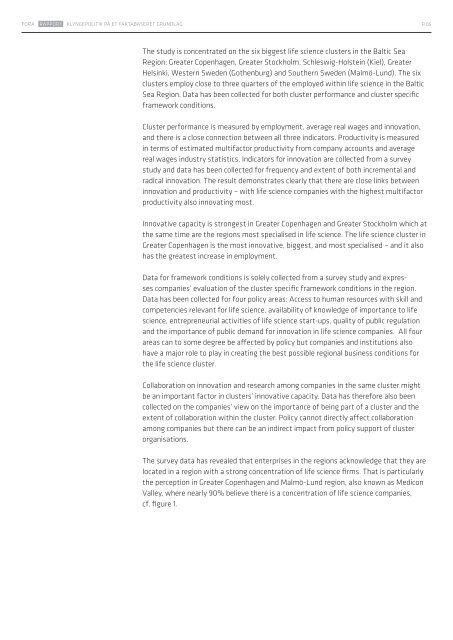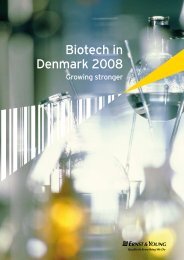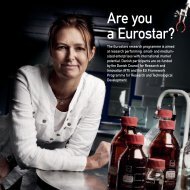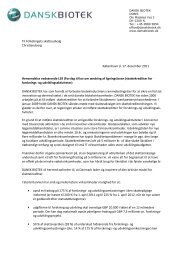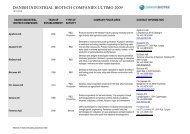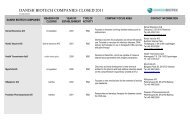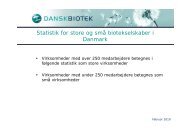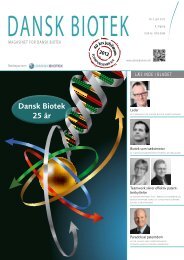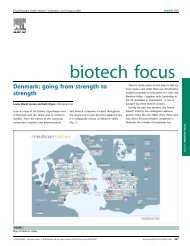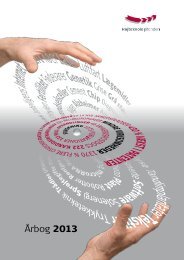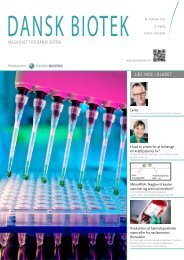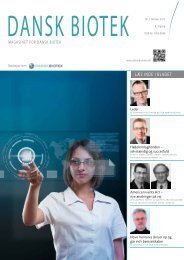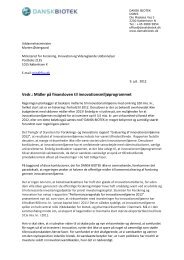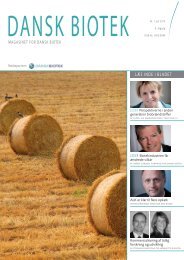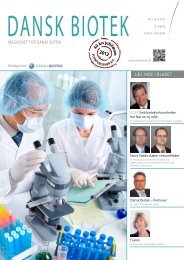Klyngepolitik på et faktabaseret grundlag - Dansk Biotek
Klyngepolitik på et faktabaseret grundlag - Dansk Biotek
Klyngepolitik på et faktabaseret grundlag - Dansk Biotek
You also want an ePaper? Increase the reach of your titles
YUMPU automatically turns print PDFs into web optimized ePapers that Google loves.
FORA RAPPORT KLYNGEPOLITIK PÅ ET FAKTABASERET GRUNDLAG P.05<br />
The study is concentrated on the six biggest life science clusters in the Baltic Sea<br />
Region: Greater Copenhagen, Greater Stockholm, Schleswig-Holstein (Kiel), Greater<br />
Helsinki, Western Sweden (Gothenburg) and Southern Sweden (Malmö-Lund). The six<br />
clusters employ close to three quarters of the employed within life science in the Baltic<br />
Sea Region. Data has been collected for both cluster performance and cluster specific<br />
framework conditions.<br />
Cluster performance is measured by employment, average real wages and innovation,<br />
and there is a close connection b<strong>et</strong>ween all three indicators. Productivity is measured<br />
in terms of estimated multifactor productivity from company accounts and average<br />
real wages industry statistics. Indicators for innovation are collected from a survey<br />
study and data has been collected for frequency and extent of both incremental and<br />
radical innovation. The result demonstrates clearly that there are close links b<strong>et</strong>ween<br />
innovation and productivity – with life science companies with the highest multifactor<br />
productivity also innovating most.<br />
Innovative capacity is strongest in Greater Copenhagen and Greater Stockholm which at<br />
the same time are the regions most specialised in life science. The life science cluster in<br />
Greater Copenhagen is the most innovative, biggest, and most specialised – and it also<br />
has the greatest increase in employment.<br />
Data for framework conditions is solely collected from a survey study and expresses<br />
companies’ evaluation of the cluster specific framework conditions in the region.<br />
Data has been collected for four policy areas: Access to human resources with skill and<br />
comp<strong>et</strong>encies relevant for life science, availability of knowledge of importance to life<br />
science, entrepreneurial activities of life science start-ups, quality of public regulation<br />
and the importance of public demand for innovation in life science companies. All four<br />
areas can to some degree be affected by policy but companies and institutions also<br />
have a major role to play in creating the best possible regional business conditions for<br />
the life science cluster.<br />
Collaboration on innovation and research among companies in the same cluster might<br />
be an important factor in clusters’ innovative capacity. Data has therefore also been<br />
collected on the companies’ view on the importance of being part of a cluster and the<br />
extent of collaboration within the cluster. Policy cannot directly affect collaboration<br />
among companies but there can be an indirect impact from policy support of cluster<br />
organisations.<br />
The survey data has revealed that enterprises in the regions acknowledge that they are<br />
located in a region with a strong concentration of life science firms. That is particularly<br />
the perception in Greater Copenhagen and Malmö-Lund region, also known as Medicon<br />
Valley, where nearly 90% believe there is a concentration of life science companies,<br />
cf. figure 1.


